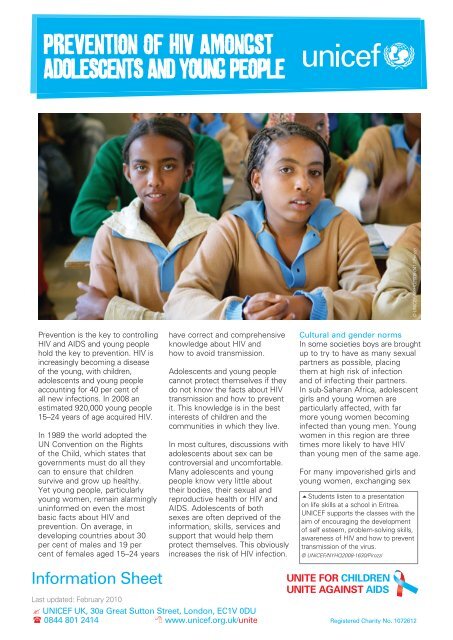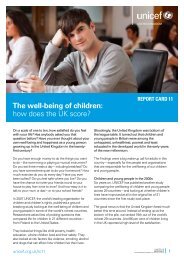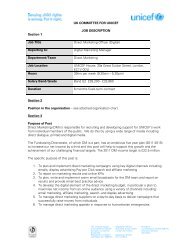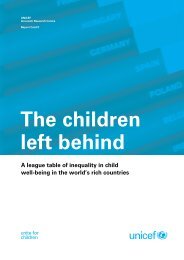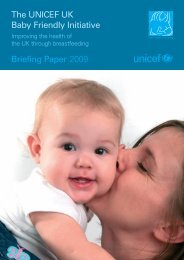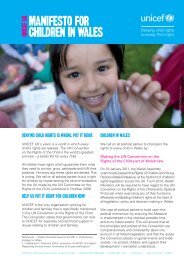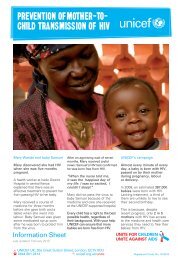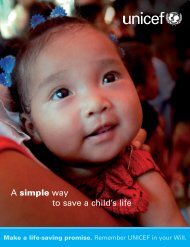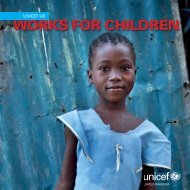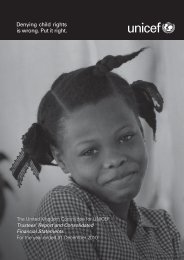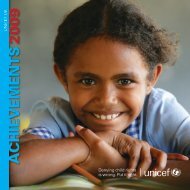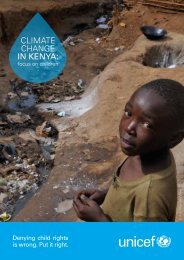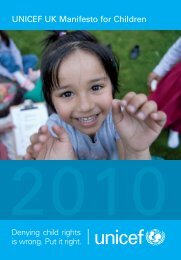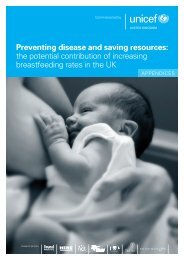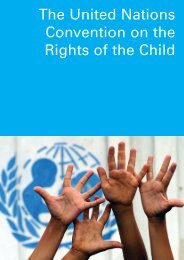prevention of Hiv Amongst Adolescents And young people - Unicef UK
prevention of Hiv Amongst Adolescents And young people - Unicef UK
prevention of Hiv Amongst Adolescents And young people - Unicef UK
You also want an ePaper? Increase the reach of your titles
YUMPU automatically turns print PDFs into web optimized ePapers that Google loves.
<strong>prevention</strong> <strong>of</strong> HIV <strong>Amongst</strong><br />
adolescents and <strong>young</strong> <strong>people</strong><br />
© UNICEF/NYHQ2006-0411/Pirozzi<br />
Prevention is the key to controlling<br />
HIV and AIDS and <strong>young</strong> <strong>people</strong><br />
hold the key to <strong>prevention</strong>. HIV is<br />
increasingly becoming a disease<br />
<strong>of</strong> the <strong>young</strong>, with children,<br />
adolescents and <strong>young</strong> <strong>people</strong><br />
accounting for 40 per cent <strong>of</strong><br />
all new infections. In 2008 an<br />
estimated 920,000 <strong>young</strong> <strong>people</strong><br />
15–24 years <strong>of</strong> age acquired HIV.<br />
In 1989 the world adopted the<br />
UN Convention on the Rights<br />
<strong>of</strong> the Child, which states that<br />
governments must do all they<br />
can to ensure that children<br />
survive and grow up healthy.<br />
Yet <strong>young</strong> <strong>people</strong>, particularly<br />
<strong>young</strong> women, remain alarmingly<br />
uninformed on even the most<br />
basic facts about HIV and<br />
<strong>prevention</strong>. On average, in<br />
developing countries about 30<br />
per cent <strong>of</strong> males and 19 per<br />
cent <strong>of</strong> females aged 15–24 years<br />
Information Sheet<br />
have correct and comprehensive<br />
knowledge about HIV and<br />
how to avoid transmission.<br />
<strong>Adolescents</strong> and <strong>young</strong> <strong>people</strong><br />
cannot protect themselves if they<br />
do not know the facts about HIV<br />
transmission and how to prevent<br />
it. This knowledge is in the best<br />
interests <strong>of</strong> children and the<br />
communities in which they live.<br />
In most cultures, discussions with<br />
adolescents about sex can be<br />
controversial and uncomfortable.<br />
Many adolescents and <strong>young</strong><br />
<strong>people</strong> know very little about<br />
their bodies, their sexual and<br />
reproductive health or HIV and<br />
AIDS. <strong>Adolescents</strong> <strong>of</strong> both<br />
sexes are <strong>of</strong>ten deprived <strong>of</strong> the<br />
information, skills, services and<br />
support that would help them<br />
protect themselves. This obviously<br />
increases the risk <strong>of</strong> HIV infection.<br />
Cultural and gender norms<br />
In some societies boys are brought<br />
up to try to have as many sexual<br />
partners as possible, placing<br />
them at high risk <strong>of</strong> infection<br />
and <strong>of</strong> infecting their partners.<br />
In sub-Saharan Africa, adolescent<br />
girls and <strong>young</strong> women are<br />
particularly affected, with far<br />
more <strong>young</strong> women becoming<br />
infected than <strong>young</strong> men. Young<br />
women in this region are three<br />
times more likely to have HIV<br />
than <strong>young</strong> men <strong>of</strong> the same age.<br />
For many impoverished girls and<br />
<strong>young</strong> women, exchanging sex<br />
5Students listen to a presentation<br />
on life skills at a school in Eritrea.<br />
UNICEF supports the classes with the<br />
aim <strong>of</strong> encouraging the development<br />
<strong>of</strong> self esteem, problem-solving skills,<br />
awareness <strong>of</strong> HIV and how to prevent<br />
transmission <strong>of</strong> the virus.<br />
© UNICEF/NYHQ2008-1630/Pirozzi<br />
Last updated: February 2010<br />
? UNICEF <strong>UK</strong>, 30a Great Sutton Street, London, EC1V 0DU<br />
( 0844 801 2414 8 www.unicef.org.uk/unite Registered Charity No. 1072612
for money, food or other benefits<br />
may be the only way to make a<br />
living or support their families.<br />
Poverty and cultural norms in<br />
many regions, notably South Asia<br />
and sub-Saharan Africa, mean<br />
that a significant percentage <strong>of</strong><br />
girls are married before the age<br />
<strong>of</strong> 18. However, marriage itself<br />
provides no protection from<br />
HIV. Many married women are<br />
subject to domestic violence or<br />
sexual abuse, even within their<br />
own families. Even if they remain<br />
faithful, they have little or no<br />
power or ability to negotiate the<br />
conditions <strong>of</strong> sexual intercourse,<br />
including condom usage.<br />
Avoiding risk<br />
There is clear evidence <strong>of</strong> the<br />
effectiveness <strong>of</strong> comprehensive<br />
strategies for keeping adolescents<br />
and <strong>young</strong> <strong>people</strong> free <strong>of</strong> infection<br />
and helping them to avoid risk.<br />
Young <strong>people</strong> need practical<br />
help in the form <strong>of</strong> youth-friendly<br />
health services where they can<br />
get condoms, obtain treatment<br />
for sexually transmitted infections<br />
and seek informed advice. For the<br />
most marginalised <strong>young</strong> <strong>people</strong>,<br />
such as those who inject drugs,<br />
even more specialised <strong>prevention</strong><br />
services, such as needleexchange<br />
programmes, are also<br />
essential in preventing infection.<br />
The <strong>prevention</strong> <strong>of</strong> HIV infection<br />
works best when adolescents<br />
and <strong>young</strong> <strong>people</strong> can control<br />
their health and their future, and<br />
are sufficiently empowered to be<br />
able to change their behaviours.<br />
Education<br />
There is compelling evidence that<br />
a basic education <strong>of</strong> good quality,<br />
<strong>of</strong>fering sound knowledge about<br />
sexuality and HIV and including<br />
life-skills training, can make a<br />
significant contribution to the<br />
<strong>prevention</strong> <strong>of</strong> HIV and AIDS.<br />
HIV and AIDS threaten the<br />
right to an education<br />
HIV and AIDS threaten both<br />
the supply <strong>of</strong> and demand for<br />
education. Large numbers <strong>of</strong><br />
teachers have died <strong>of</strong> AIDSrelated<br />
causes, stripping schools<br />
<strong>of</strong> their most vital resource<br />
and robbing children <strong>of</strong> quality<br />
education. The chronic illness<br />
and death <strong>of</strong> a parent drains<br />
household resources available<br />
for education, and children<br />
are likely to drop out <strong>of</strong> school<br />
to care for sick adults or to<br />
go to work to meet the new<br />
shortfall in the family income.<br />
Girls’ education<br />
An effective strategy for<br />
preventing HIV and AIDS among<br />
children and <strong>young</strong> <strong>people</strong><br />
is to ensure that all children<br />
receive formal education in safe<br />
and gender-sensitive school<br />
environments. However, in 2006<br />
some 75 million children – 55<br />
per cent <strong>of</strong> them girls – were<br />
not in primary education. With<br />
women comprising half <strong>of</strong> all<br />
<strong>people</strong> with HIV worldwide<br />
and 60 per cent <strong>of</strong> infections<br />
in sub-Saharan Africa, it is vital<br />
that we equip <strong>young</strong> women<br />
and girls with the knowledge,<br />
skills and confidence to assert<br />
themselves in relationships.<br />
UNICEF strongly advocates for<br />
the abolition <strong>of</strong> school fees – an<br />
action that will particularly benefit<br />
poor children, including those<br />
affected by HIV and AIDS. UNICEF<br />
supports other measures such as<br />
school feeding programmes and<br />
flexible learning that encourage<br />
children and <strong>young</strong> <strong>people</strong> to<br />
continue with their education<br />
whatever the circumstances.<br />
Education opportunities<br />
Education represents the best<br />
opportunity not only for delivering<br />
crucial information on HIV and<br />
AIDS, but also for countering the<br />
ignorance and fear that perpetuate<br />
stigma and discrimination.<br />
UNAIDS studies show that when<br />
<strong>young</strong> <strong>people</strong> are provided with<br />
accurate information on sex and<br />
HIV and AIDS, they are more<br />
likely to delay sexual activity and<br />
more likely to use condoms when<br />
they finally have sex. Schools<br />
are the hub for such <strong>prevention</strong><br />
lessons but because so many<br />
<strong>young</strong> <strong>people</strong> in the developing<br />
world cannot or do not go to<br />
school, UNICEF also supports<br />
non-formal education opportunities<br />
and the dissemination <strong>of</strong> lifesaving<br />
information through<br />
other channels including the<br />
media and social clubs.<br />
Life skills<br />
It is insufficient just to provide<br />
<strong>young</strong> <strong>people</strong> with information<br />
though. They also need to<br />
develop “life skills” in order to<br />
put what they know into practice.<br />
Moreover, they need “youth<br />
friendly” health services that are<br />
sensitive to gender issues and<br />
provide voluntary and confidential<br />
HIV testing and counselling, along<br />
with condoms (plus guidance on<br />
correct use) and treatment for other<br />
sexually transmitted infections.<br />
A virtuous continuum<br />
The struggle to control the HIV<br />
and AIDS pandemic and lessen<br />
its impact on children demands<br />
an attack on three fronts:<br />
preventing infection, treating the<br />
sick, and caring for the vulnerable.<br />
The efficacy <strong>of</strong> such a<br />
comprehensive approach in<br />
the battle against HIV and AIDS<br />
has been highlighted by recent<br />
evidence <strong>of</strong> the impact that<br />
treatment with anti-retroviral drugs<br />
is having on HIV-<strong>prevention</strong> efforts.<br />
Please join us and Unite for<br />
Children, Unite against AIDS.<br />
UNICEF works with families,<br />
communities and governments<br />
in more than 190 countries to<br />
transform children’s lives by<br />
protecting and promoting their rights.<br />
Denying child rights is wrong.<br />
Campaign, donate or raise<br />
money and help us put it right.<br />
To find out more about UNICEF’s<br />
work to help children affected<br />
by HIV and AIDS, and how<br />
you can help protect and<br />
promote child rights, please go<br />
online: unicef.org.uk/unite<br />
or call ( 0844 801 2414<br />
UNICEF is funded entirely<br />
through voluntary donations.<br />
? UNICEF <strong>UK</strong>, 30a Great Sutton Street, London, EC1V 0DU ( 0844 801 2414 8 www.unicef.org.uk/unite


